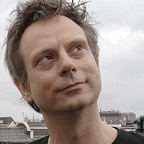The DIY of life in Singularity
Last Tuesday evening I attended the first open edition of the Singularity University event in the Netherlands. It was my second after the debut event in the beginning of 2012. I’m not a uncritically believer in the singularity per se, but I have a positive feeling on technology and the benefits. It is not the healer of all, it changes the context of the way we things do and gradually improves certain things, at the same time overall values will balance out in new forms. The closing talk of Bruce Sterling at SXSW is in that sense a good antidote of the hailing stories on technology abundance.
But that is not something I wanted to elaborate on now, maybe sometime in the future. For me the reason to attend the sessions is the positive vibe and inspiration you can harvest from the utopians. Adding your own context make it valuable for thinking on the future, also the near one. And that is also something that is strongly present in these events. It gives good insights in the bigger changes in our world. And one that was very heavenly part of this event was the moving to a DIY world. You can say that singularity equals self-made-manship. We are in control of our own life expectation is the bigger picture, for the now we see a strong shift to DIY services and behaviour.
Yuri van Geest kicked of which a pile of examples, and Maarten den Braber added those from the quantified self culture. DIY health is of course important as shown in the talk on SynBio. And the two startups did pinpoint this as well; the 3D Hubs to make 3D printing even more accessible. And Poikos that scan your body as the starting point for all kind of self reflection. Jack Andraka showed how DIY science can lead to stunning results.
Harald Neidhardt of MLove gave probably the broadest reflections in his talk. The iPhones 8 to 20 are always good metaphors for thinking, however those will maybe not ever exist. Interesting of the story of the disappearing phone is the way he sketched how human and tech is really morphing. Everything is software as Andreessen stated a couple years ago. He meant all stuff we use, all services. That leads to disruptive models and experiences. Imagine what happens as we humans are completely compatible to the computed world. We are not living in the cloud, we are the cloud.
You can think we have this total DIY context in a couple years, and we can manipulate and control everything ourselves. I think we will see that the model of producer and consumer and regulator will find a new balance. Just like the future will not come to us as a big bang, will technology not change all of the characteristics of human behaviour. With the DIY culture we may refer back to some models we used to have in the craftsmanship-ages. As Sterling made clear; the future is not one-dimensional.
